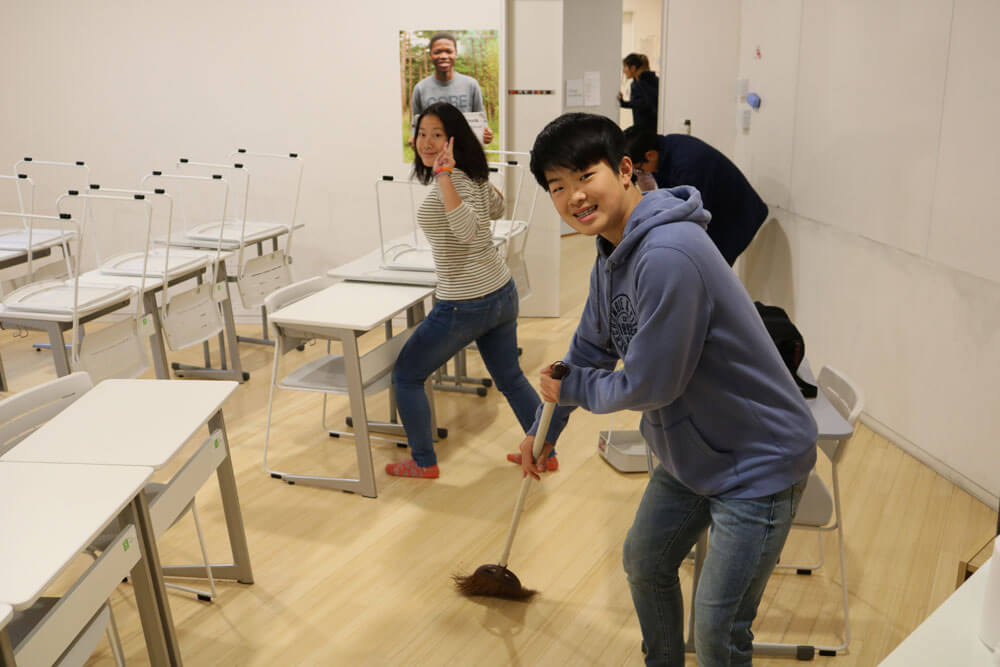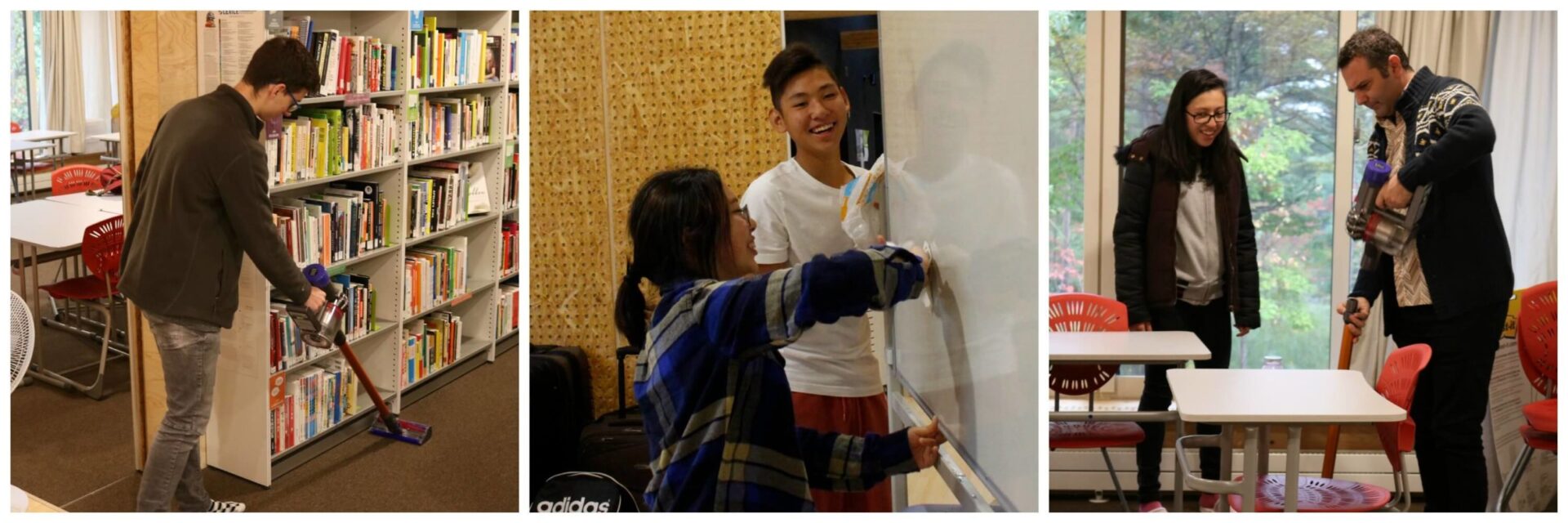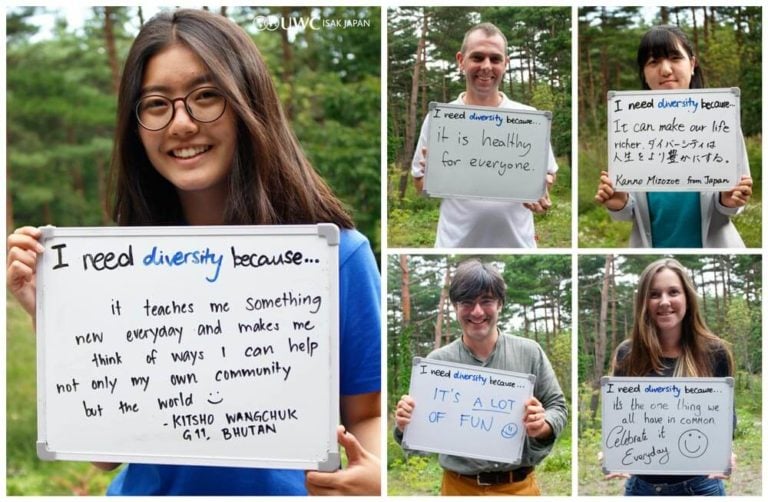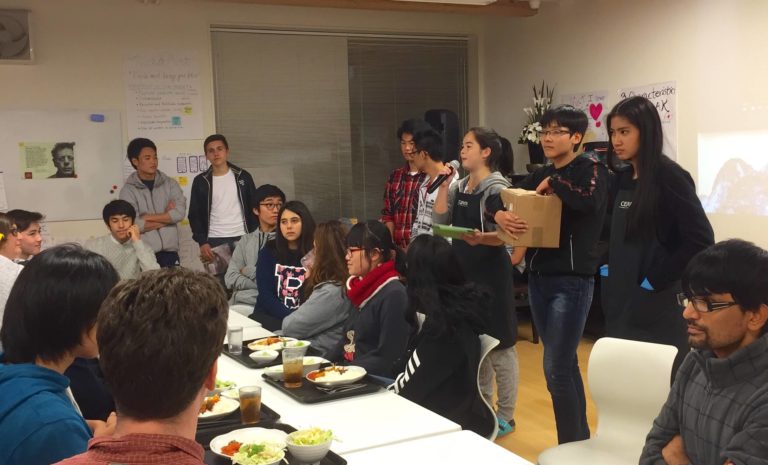Written by Pran (Class of 2018, Thailand/USA)
 Stop and Clean refers to the time between 1:20 – 1:40 PM everyday where all UWC ISAK Japan students are required to drop everything they are doing and shuffle to their designated areas to clean. To no one’s surprise, the mentioning of Stop and Clean creates all sorts of reactions from the people here. Though I generally avoid generalizing things, the responses I’ve received from casually asking around mixed with my own observations share striking similarities. Some enthusiastically embrace it, seeing Stop and Clean as a time dedicated to the betterment of our lives where everyone gathers to work towards a common cause. Others are not as keen, preferring only to do their share of cleaning – a little more perhaps but nothing significantly less. The third, extreme few among us that opt for a completely hands-off approach from cleaning – provoking everyone else but their own kin in the process – fittingly find themselves at the forefront of (negative) attention. Most, including myself, would fall somewhere between the first two.
Stop and Clean refers to the time between 1:20 – 1:40 PM everyday where all UWC ISAK Japan students are required to drop everything they are doing and shuffle to their designated areas to clean. To no one’s surprise, the mentioning of Stop and Clean creates all sorts of reactions from the people here. Though I generally avoid generalizing things, the responses I’ve received from casually asking around mixed with my own observations share striking similarities. Some enthusiastically embrace it, seeing Stop and Clean as a time dedicated to the betterment of our lives where everyone gathers to work towards a common cause. Others are not as keen, preferring only to do their share of cleaning – a little more perhaps but nothing significantly less. The third, extreme few among us that opt for a completely hands-off approach from cleaning – provoking everyone else but their own kin in the process – fittingly find themselves at the forefront of (negative) attention. Most, including myself, would fall somewhere between the first two.
To me, I treat Stop and Clean as one of the few opportunities we get on a regular basis to live out the many noble values of UWC ISAK we so often praise. Though many of us are guilty of moaning about it – some outright neglecting it once workload begins to pile up – every now and then, I believe Stop and Clean actually serves as a constant reminder that nothing worth having comes easy. In this case, everyone desires a nice, clean house to live in, yet not equally many are willing to work for it.
In years past, the main issue behind enforcing the Stop and Clean prototype has always been accountability. There was no real system in place to keep people in check. Over time, those who continued to perform their cleaning routines diligently could not help but feel slightly discouraged by the relative nonchalance shown by their less community-minded housemates.

As of this academic year, Stop and Clean has been set to twenty minutes per day from 1:20 – 1:40 PM, the short stretch of time between lunch and the resumption of classes in the afternoon. There are teachers present to help oversee the process (and of course, ensure it takes place) and join in themselves when appropriate. Every student is assigned a specific location to clean every day, establishing consistency so as to avoid confusion and minimize inefficiency. After all, how can we have enough time to do actual cleaning should everyone spend half of that trying to figure out where to clean for the day, let alone what to clean? Though far from perfect, I can comfortably say it’s the best we’ve had yet as a school.
As a third-year student about to graduate this upcoming May, I’m afforded the luxury of hindsight that approximately two thirds of the students here are not. In my first year, I lived in Boys House 2 (now R1-11) when it was, and still is, used for classes. The KAC ceased to exist then. With so many living together in such a tight space, I was skeptical but hopeful of the likelihood of us boys keeping clean for months. It turned out my skepticism was sadly justified as the common space, followed by the stairs, immediately began to clutter up in filth post-Orientation Week. Halfway through the year, our house finally came together to address the uncomfortable truth and unanimously agreed to make Stop and Clean stricter (and feel more “compulsory”) for everyone. The change produced immediate, though short-lived, results. Without any real power to force certain individuals in the house to clean, we were ultimately forced to rely on the noticeably unreliable goodwill of everyone, which was present in much greater quantities in the minds of some than others.
Moving forward, I am curious to see how the balance between mutual trust and surveillance will play out. From my past experiences with living in any type of community, a pure honor system is bound to fail long before it even takes effect. To allow for such a system to work, the mindsets of all its participants need to be in near complete agreement – an unrealistic expectation to harbor in most situations. On the hand, a draconian system where there is a complete absence of trust is not necessarily the way to go either. This, in turn, would most likely result in everyone becoming needlessly paranoid at best, perpetually miserable at worst. What do you think?
This article first appeared in Catalysm, the student magazine at UWC ISAK Japan.





